“Israeli officials say Jerusalem cannot afford to have sensitive defense systems stationed in the UAE, which maintains full diplomatic and trade ties with Iran, at this time,” a December 12 report in Israel Hayom said. The report was about how Abu Dhabi had sought Israeli air-defense systems over the past year, even prior to the Abraham Accords.
“Jerusalem is under pressure from Abu Dhabi to sell the Arab Gulf state an Israeli-developed aerial defense system for billions of dollars,” the report said. This report was picked up by The New Arab and spun in a way that made it seem Israel-UAE relations might suffer from the Emirates reaching out to Iran.
“The refusal to sell the UAE the Iron Dome and what is known as David’s Sling, both used to intercept short-range and winged missiles, came after the Gulf state allowed Iranians to enter and move freely in its territory,” Israel Hayom reported.
There is no real evidence of this shift. The original report indicated that the requests for air defense actually go back more than a year. Therefore, the reports have nothing to do with current UAE-Iran discussions.
The reality is that David’s Sling and Iron Dome are both programs that receive US support – and Iron Dome, which is made in Israel by Rafael Advanced Defense Systems, is now made in the US with Raytheon. The US has acquired two Iron Dome batteries.

A more reasonable question about Israeli-developed air defense being sold in the region might relate to systems such as Spyder, which are not as sensitive as Iron Dome and are not supported with US funding.
The UAE has been reaching out to Iran. This began with reports in early December that its national security adviser, Sheikh Tahnoon bin Zayed Al Nahyan, would visit the Islamic Republic.
The Emirates has also sought to patch some things up with Turkey. Remember that back when the Abraham Accords were announced, Turkey threatened to break relations with the UAE. Ankara backs the Muslim Brotherhood and has an anti-Israel regime in power that has backed Hamas.
Turkey didn’t want Israel to have peace with the UAE and Bahrain. Now it is isolated and needs the Emirates. Tehran also has reasons to patch things up with the Gulf as it struggles with Iran deal talks in Vienna.
When Prime Minister Naftali Bennett went to the UAE at the end of last week, a report in Haaretz claimed it could be part of a “regional, anti-Iran defense pact.”
This doesn’t seem reasonable. The UAE doesn’t want to be part of an anti-Iran pact. Its real interest is moderation, economic empowerment and increasing the arc of stability in the region. This means work with Israel, Cyprus, Greece, Jordan, Saudi Arabia and Egypt – and further afield, with India, France, the US, the UK and possibly more amicable relations with Turkey and Iran.
Israel is concerned about Iran’s nuclear program. The UAE may be concerned about Iran’s destabilizing activities, but it also knows that Tehran is willing to use hard power like militias in Yemen, Iraq, Syria and Lebanon and that Iran arms them with drones and missiles.
Iran even used drones to attack a commercial tanker in the Gulf of Oman in July. In May 2019, Iran attacked four tankers off the coast of the UAE, and it attacked two more in June 2019. It has even threatened roll-on-roll-off commercial vessels in the Gulf it thinks are linked to Israel. Iran has expanded its navy, its IRGC fast boats and its drone program in recent years.
The UAE has no interest in being involved in these kinds of tensions. Iran has shown it can attack Saudi’s Abqaiq, not far from the Emirates, so Tehran has the power to destabilize.
Drone defenses may be a way to contend with this, but the overall goal of Abu Dhabi is to work successfully on several diplomatic files for now, and that can mean talks with Iran, Turkey and Israel at the same time. The Gulf crisis with Qatar is also over, and the UAE and Saudi Arabia don’t necessarily have the same policy in Yemen.
